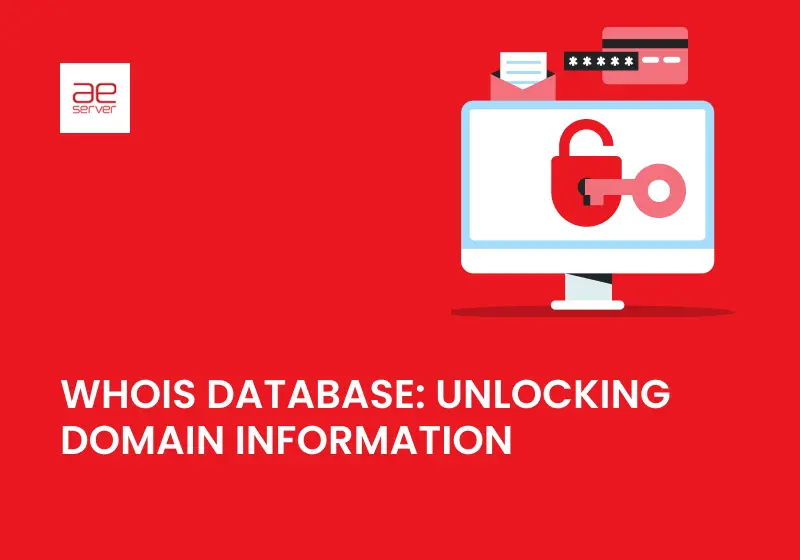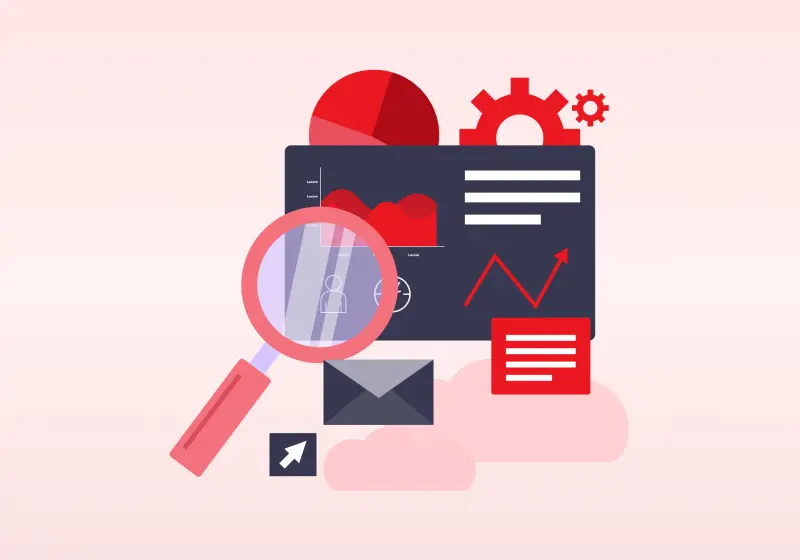
WHOIS Database: Unlocking Domain Information
The WHOIS database stands as a pivotal tool in the digital realm. It offers unparalleled insights into the world of domain ownership and internet infrastructure. This database serves as a repository of information containing essential details about:
- Domain registrations.
- The registrant’s contact information.
- Registration and end dates.
- Domain name servers.
Such data not only aids in identifying the rightful owners of websites. But it also contributes to maintaining cybersecurity and combating online fraud. Unraveling the layers of the WHOIS database unveils a treasure trove of knowledge for:
- Cybersecurity experts.
- Law enforcement agencies.
- Researchers.
- Businesses alike.
This information is important for many things. They keep brands safe and ensure people’s creative work is respected online. It also helps us know if a website is trustworthy. But there are arguments about how much domain information should be on public. Exploring the details of the WHOIS database helps to know how vital how the internet works. It also makes us talk more about how to keep things private and secure while we move forward in the digital world.
Understanding the WHOIS Database
The WHOIS database is like a big phone book for websites. It has many important details about who owns a website, their name, email, and where they live. It also has when the website was made and when it will expire, plus info about the computers running it. This helps everyone know who’s responsible for a website and keeps things fair.
Police use WHOIS database info to catch online bad guys. And businesses use it to protect their names. But some people worry about their privacy, so there’s a debate about how much info should be public. Finding the right balance between sharing info and keeping things private is important. Technology grows, and people care more about privacy. Then, understanding the WHOIS database helps make good rules for the internet’s future.
WHOIS Lookup Services

In the big online world, many special tools help us learn about websites and who owns them. These tools are called WHOIS lookup services. They’re like secret detectives. They give us important website information, like who made them and when.
In this block, we’ll dive into how these detective services work and why they’re so important. We’ll learn how they help us better understand websites, keep us safe from online problems, and ensure everyone follows the rules.
Exploring WHOIS lookup services will help us see how they fit into the internet puzzle. And we will know how they help us find the right balance between:
- Sharing information.
- Keeping things private.
It’s like learning the secrets of the online world! Let’s dive into it!
Exploring Domain Ownership
The main considerations are:
- Domain Registrant Information. WHOIS lookup services provide access to essential details about domain ownership. It includes the registrant’s name, email address, physical address, and contact number. This information aids in identifying and verifying the authenticity of domain owners.
- Registration and End Dates. Users can retrieve the registration and end dates of a domain. It offers insights into the domain’s lifecycle. This information is crucial for businesses. It ensures timely renewals and prevents potential loss of their online presence.
- Domain Name Servers (DNS). WHOIS services reveal the domain’s DNS information. It allows us to understand the servers responsible for routing traffic to the website. This knowledge is valuable for web administrators and IT professionals managing online infrastructure.
Cybersecurity and Investigations
The main considerations are:
- Cybercrime Detection. Law enforcement agencies and cybersecurity experts use WHOIS lookup services. It’s to investigate and track down cybercriminals. The information assists in identifying malicious websites, phishing attempts, and other online threats.
- Digital Footprint Analysis. Researchers use WHOIS data. It’s to study the digital footprints of individuals, organizations, or malicious actors. This aids in understanding online behavior patterns, affiliations, and potential threats.
- IP Address Mapping. WHOIS data can be used to map IP addresses to specific domains. It enables the identification of potential vulnerabilities and risks. They’re associated with particular websites or servers.
Business and Brand Protection
They are:
- Brand Monitoring. Companies use WHOIS services to track domain registrations. It might infringe upon their brand names. This allows them to take legal action or negotiate for domain ownership.
- Intellectual Property Enforcement. Intellectual property owners use WHOIS data. It’s to identify domains infringing upon trademarks, copyrights, or patents. This assists in protecting their creative assets and maintaining brand integrity.
- Competitor Analysis. Businesses can gather information about their competitors’ online presence through WHOIS lookup services. They gain insights into their domain strategies and potential expansion plans.
Domain Acquisition and Sales
They are:
- Domain Valuation. Individuals and companies interested in buying or selling domains use WHOIS data. It’s to assess the value of specific domains based on several factors. They’re age, registration history, and ownership information.
- Contact Information. Potential buyers use WHOIS services. It’s to identify and contact domain owners for negotiation purposes. It streamlines the process of acquiring desired domains.
Regulatory Compliance
The main considerations are:
- GDPR Compliance. In light of data protection regulations like GDPR, WHOIS lookup services have adapted to balance privacy rights with the need for transparency. Access to personal data is in limit. It aligns with privacy regulations while still offering essential domain information.
- Legal and Law Enforcement Requests. Legal authorities and law enforcement agencies leverage WHOIS services. It’s to get information needed for investigations, subpoenas, or court cases.
Research and Analysis
The main considerations are:
- Internet Governance Studies. Researchers in the field of internet governance use WHOIS data. It analyzes trends in domain registrations, ownership concentration, and geographic distribution. It provides insights into the global internet landscape.
- Market Intelligence. WHOIS services contribute to market intelligence. They offer data on emerging trends, industry shifts, and the growth of online businesses.
Ethical Considerations
They are:
- Privacy Concerns. The accessibility of personal information in WHOIS data raises privacy concerns. Balancing the need for transparency with individuals’ right to privacy is a challenge.
- Data Accuracy. Ensuring the accuracy of WHOIS database is crucial. It’s for maintaining the reliability of the information provided. Inaccurate or outdated data can lead to misunderstandings. And it potentially hinders legitimate online activities.
Future Developments
The main considerations are:
- Blockchain Integration. Some initiatives explore integrating blockchain technology. It’s to enhance the security and reliability of domain ownership information.
- Automated Services. Automation and artificial intelligence are being explored to streamline and enhance retrieving and analyzing WHOIS data.
- Global Collaboration. The evolution of WHOIS lookup services requires global collaboration. It’s among stakeholders, including registrars, registries, legal entities, and privacy advocates. It’s to establish effective and balanced policies.
The Significance of WHOIS in Domain Hosting

In websites, WHOIS is an important tool. It helps us understand who owns a website and keeps things safe and fair. Imagine it like a special detective that checks out websites. This detective is good at showing us website details, like who made them and when. We’re going to dive into why this detective work is so important for hosting websites.
It helps businesses protect their names. And this makes sure websites are secure and follows the rules. As we explore the significance of WHOIS in hosting websites, we’ll discover how it’s like a superhero that keeps everything running smoothly and ensures everyone plays by the rules. It’s like the guardian of the website world.
Transparency and Accountability
The main considerations are:
- Ownership Verification. WHOIS data provides essential information about domain ownership. It lets us verify the legitimacy of a website and its associated hosting services. This transparency fosters trust among online users.
- Contact Information. Hosting companies’ contact details in the WHOIS database allow users to reach out in case of technical issues, support queries, or concerns related to their websites.
Cybersecurity and Abuse Prevention
They are:
- Identifying Malicious Activities. Cybersecurity professionals leverage WHOIS information. WHOIS identifies domains associated with malware distribution, phishing scams, and other malicious activities. It allows for timely intervention.
- Fraud Detection. Hosting providers can use WHOIS data. They detect fraudulent domain registrations or unauthorized use of their services. It safeguards their reputation and clients.
Technical Insights
The main considerations are:
- Server Administration. Hosting companies can use WHOIS data. It’s to gain insights into clients’ domain portfolios. And this facilitates efficient server allocation and resource management.
- DNS Management. WHOIS data reveals the domain’s DNS servers. It aids administrators in configuring and managing domain-related settings for optimal website performance.
Legal and Compliance
The main considerations are:
- Terms of Service Enforcement. Hosting providers can enforce their terms of service. It identifies domains that violate their policies or engage in prohibited activities.
- Copyright Infringement. WHOIS assists to identify clients who might be hosting copyrighted content without authorization. It helps them take appropriate actions to avoid legal liabilities.
Customer Support
The focus in on:
- Domain Transfer Help. Hosting support teams use WHOIS data. WHOIS assists customers with domain transfer processes. This ensures smooth transitions between hosting providers.
- Billing and Renewal Reminders. Hosting companies use WHOIS data. They send renewal reminders and billing notifications to clients. This reduces the likelihood of unintentional service disruptions.
Domain Portfolio Management
The main considerations are:
- Resource Planning. Individuals and businesses managing many domains can use WHOIS data. It’s to plan and optimize their domain portfolio, aligning with their online objectives.
- Marketplace Participation. Hosting domain investors and sellers use WHOIS data. They identify potential buyers or sellers, facilitating transactions in the marketplace.
Resolving Disputes
The focus in on:
- Domain Ownership Disputes. In cases of disputed domain ownership, WHOIS information can serve as a reference. It’s to establish legitimate ownership and resolve conflicts.
Future Evolution
They are:
- Enhanced Privacy Measures. As concerns over data privacy grow, hosting providers and domain registrars are working to install privacy features in WHOIS services, striking a balance between transparency and individual rights.
- Blockchain Integration. This enhances security, accuracy, and decentralization in domain registration and hosting information.
Global Collaboration
The focus in on:
- Policy Development. As technology evolves, industry stakeholders must collaborate. It’s to develop policies that address emerging challenges. And this is to ensure WHOIS remains an effective tool for the domain hosting ecosystem.
- Industry Standards. Continued collaboration among hosting providers, registrars, and industry regulators is essential. It’s to establish standardized practices for WHOIS data collection, accuracy, and dissemination.
Unveiling the Future: Innovations in WHOIS Technology
The domain of WHOIS technology is on the brink of a revolutionary transformation. It’s poised to redefine how we manage, protect, and use online identities. The following innovations mark the dawn of a new era in WHOIS service technology:
- Blockchain Integration. WHOIS technology is moving towards decentralized, tamper-proof records. It ensures transparency, security, and immutability in domain ownership information.
- AI-Driven Insights. Artificial intelligence is driving advancements in WHOIS data analysis. It enables in-depth insights into domain trends, ownership patterns, and potential security threats. It ultimately enhances cybersecurity measures.
- Predictive Analytics. WHOIS service is evolving to predict domain-related risks and threats through sophisticated algorithms. It empowers organizations to mitigate potential malicious activities proactively.
- Extended Verification Mechanisms. Future WHOIS innovations entail multi-factor authentication and biometric verification. It will bolster the accuracy and reliability of domain ownership data.
- Global Collaboration Platforms. Innovative WHOIS services are fostering international cooperation. They provide standardized interfaces for data sharing. This simplifies cross-border domain management and ownership tracking.
- Real-Time Updates. Future WHOIS technology will enable real-time updates of domain ownership details. It will ensure accurate information is readily available to stakeholders. They are law enforcement agencies, cybersecurity experts, and businesses.
Bottom Line
The WHOIS database stands as a cornerstone. It reveals the vital threads of domain ownership, cybersecurity, and online transparency. Its significance extends beyond a mere registry. It shapes businesses’ brand protection, cybersecurity endeavors, and legal compliance.
Technology advances and privacy concerns deepen. And finding an equilibrium between transparency and data protection remains an ongoing challenge. The bottom line is clear. The WHOIS database underscores the intricate interplay of security, privacy, and digital governance. It navigates the path toward a safer and more accountable online world.
Frequently Asked Question
-
Can domain owners opt for private WHOIS registration?
The registrars offer a service known as “private WHOIS” or “WHOIS privacy protection.” This service allows domain owners to shield their personal information from public view. It substitutes contact details with those of the registrar or privacy service. It helps mitigate spam, unwanted solicitations, and potential privacy risks.
-
Are there any restrictions on accessing the WHOIS database?
Access to the WHOIS database is generally open to the public. But there have been efforts to balance privacy concerns. It leads to restrictions of personal information in compliance with data protection regulations. Some registrars and registries may install rate limits or CAPTCHA requirements. It’s to prevent excessive automated queries.
-
How often is the WHOIS database updated?
The frequency of updates to the WHOIS database varies. Domain registration and end dates are updated in real-time. At the same time, other information may do it periodically. Some changes, like administrative updates, may be subject to manual verification processes. But it results in delays.
-
Are there any privacy concerns related to the WHOIS database?
Privacy concerns have arisen. It’s due to the public accessibility of personal information in the WHOIS database. This has led to debates over the balance between transparency and data protection. Privacy regulations like GDPR have prompted changes in the way we show WHOIS. It aims to safeguard individuals’ private data.
-
How is domain ownership verified in the WHOIS database?
Domain ownership is typically verified through the registration process. There, domain owners provide accurate contact details and agree to the terms. Verification may involve email confirmation or other methods. Inaccurate or misleading information can lead to domain suspension or loss.
-
Can law enforcement agencies access the WHOIS database for investigations?
Yes, agencies often use the WHOIS database as a resource for investigations. The info in WHOIS helps identify and track one involved in illegal online activities.



